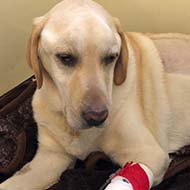Dog owners sought for autoimmune disease research

The study will collect information about dogs that have been recently diagnosed with an autoimmune disease.
Owners of dogs with autoimmune diseases are being called upon to participate in a vital piece of new research being undertaken by the RVC.
The research will be one of the largest studies of autoimmune diseases ever conducted and aims to collate data and insight into the diagnosis, treatment response and outcomes of dogs with autoimmune conditions.
Results will be distributed among local veterinary practices and specialist hospitals to help owners and vets make informed decisions when their animals are diagnosed.
Dr Barbara Glanemann, lead researcher and senior lecturer in Small Animal Medicine at the RVC, said: “This study will be the first time that the treatment and progress of dogs with autoimmune diseases has been investigated outside universities, providing an essential perspective on the challenges faced by affected dogs and their owners in wider veterinary practice."
The study, named the ImmunoRegistry, has been launched to address the current shortage of information about autoimmune diseases. It will garner information about dogs that have been recently diagnosed with an autoimmune disease, following them for a year in real-time to learn how they respond to treatment.
In total, the team aims to collect information from 400 dogs, making it the largest planned study of autoimmune diseases ever conducted in veterinary medicine globally and providing a crucial resource for future research.
James Swann, a postdoctoral fellow at Columbia University, New York, said: "There is an urgent need to optimise the treatment of dogs with autoimmune diseases, and this study represents an important first step in gathering vital information to make clinical recommendations and guide future research projects.”
For more information about the study, along with the criteria for enrolment, visit rvc.onlinesurveys.ac.uk/immunoregistry



 The Animal and Plant Health Agency (APHA) has updated its online reporting service for dead wild birds.
The Animal and Plant Health Agency (APHA) has updated its online reporting service for dead wild birds.